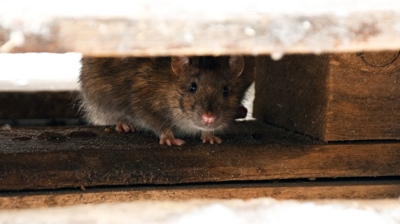
Bee Control In Plymouth, MA, And Surrounding Areas
What To Do About Bees In Plymouth
We have an estimated 380 bee species in our state. Each species is valuable to our ecosystem because all bees help with pollination — and they are exceptionally good at it. Some experts assert that bees provide one of every three bites of food we consume. Without bees, we'd "bee" in trouble. Sorry. We couldn't resist.
If you have a bee problem on your Plymouth property, it presents a delicate situation. These insects are important. Therefore, it is best to contact a licensed professional to get advice about your bee control issue, particularly if you have a hive and are in need of beehive removal.
All Bees Are Not The Same
While all bees are the same in that they are important pollinators, they can present different control problems. It is helpful to properly identify the bees bugging you. Here are a few common bee pests in our area and how they differ.
- Honey Bees: These are the least common pests in our area. But they do cause trouble every once in a while. The problem with honey bees is that they gather into a swarm to defend their nests. However, while many of these may attack at once, each bee can only sting once. It has a barb on its stinger that gets lodged in the skin and is pulled out of the abdomen of the bee after it stings.
- Bumble Bees: Who doesn't know what a bumble bee looks like? These big, fuzzy bees are native to North America and are an ever-present part of the Massachusetts landscape. Most of the time, they come into yards, do their job, and return to their nests in wooded areas. You don't have to worry too much about these bees when they're away from their nests because they're mostly docile. Unfortunately, a nest in your yard could create an issue. Bumble bees will defend their nests. The good news is that they don't swarm like honey bees. The bad news is that one bumble bee can sting you several times. It does not have a barb on its stinger.
- Carpenter Bees: These bees look like bumble bees. The key difference is that they have no visible hairs on their abdomens, so their abdomens are black and shiny. Carpenter bees don't defend their nests, and they rarely sting. Unfortunately, they damage wood by boring circular tunnels. If enough of these bees visit your property year after year, you will have to deal with property damage.
No matter what kind of bees you have on your Plymouth property, you can count on Combat Pest Control to help you get control of them. We use the latest technologies and apply them according to strict protocols.
Contact us online or call (781) 746-7393 to request a free estimate on our bee control in Plymouth today!

Don't Have A Bee Problem Yet?
The best time to deal with bees is long before you have a bee problem. Our Home Pest Guard Program is the way to go. We provide three service visits at critical times in the year; the spring, summer, and fall.
- Spring: This is the time of year when you do your spring cleaning. While you're throwing things out that you don't need, why not throw pests out as well? Spring is the time when we check your interior for pest activity, potential pest routes, conducive conditions, and other factors related to pest management and control. Along with an indoor pest inspection, we apply a barrier treatment around your exterior to keep pests out. Everything is coming back to life in the spring. Get your barrier in place before spring has sprung.
- Summer: This is the time when everything outside is alive and active. That means your pest control barrier needs a boost. We return to perform an exterior inspection and reapply your crack and crevice barrier treatment.
- Fall: When it gets cold outside, pests will try to get inside. Fall is a great time of year to perform one more inspection, apply pest control as needed, and bolster your defenses to keep rodents and other pests out.
These three services apply a barrier to shield your home from pest infestations, including bees. The last thing you need is a bee hive in a wall void or underneath your back deck. Get proactive and keep those bees out.
If you're in Plymouth, Massachusetts, you're in our service area. Contact Combat Pest Control for effective bee control in Plymouth. We have the experience and professionalism needed to help you find the right solution.
Contact us online or call (781) 746-7393 to request a free estimate on our bee control in Plymouth today!

A member of our team will be in touch shortly to confirm your contact details or address questions you may have.

Hear From Our Happy Customers
They really do say it best!
At Combat Pest Control, your satisfaction is our priority! See for yourself what our customers have to say about working with us.
-
"They were great!"
The owner came out himself and he found a second huge yellow jacket nest that we didn't even know was there and he took care of that nest too.
- Jill G. -
"Highly recommend!!!"
Combat is the best! We couldn’t live in Hanover with John and his crew! Very responsive and thorough.
- Michelle L. -
"Professional, Friendly, & Informative"
John was professional, friendly, and informative. I would highly recommend John and Combat Pest Control to anyone, and if needed in the future they will be the company I call first for any type of pest control in my home.
- Michelle R. -
"The Best!"
Chad is super knowledgeable and friendly. Appreciate his work as well as the rest of the Combat team!
- Robert P. -
"Combat is great!"
They're easy to work with, pricing is great and they always manage to get someone to my house when needed. Having a dedicated technician is helpful too to build rapport with the company.
- Anthony G. -
"I strongly recommend Combat Pest Control"
This is our third year with them. We first called because of ants in the house. I couldn't stop them. Combat did the job and we are ant-free. Combat responds quickly to an ant in the kitchen and wasps and bees nests. Thank you Combat !
- Mark C. -
"Highly recommended."
I'm very pleased with John's pest control performed on my house in south Weymouth. He has found the nest of the ants. I really appreciate his professionalism. Will hire them again and again.
- Shirley H. -
"Made Everything Easy for Us"
John & the Combat team know our house well and the critters that challenge us. He's quick to respond to any attempted incursion and quickly responds to defeat them. They also take great care in working around our dogs
- Kristen P.






